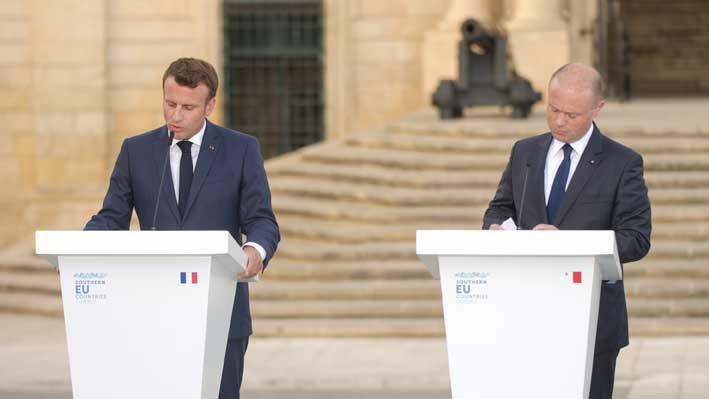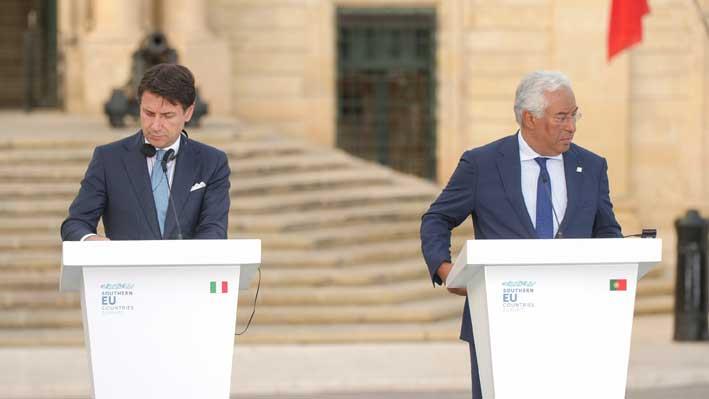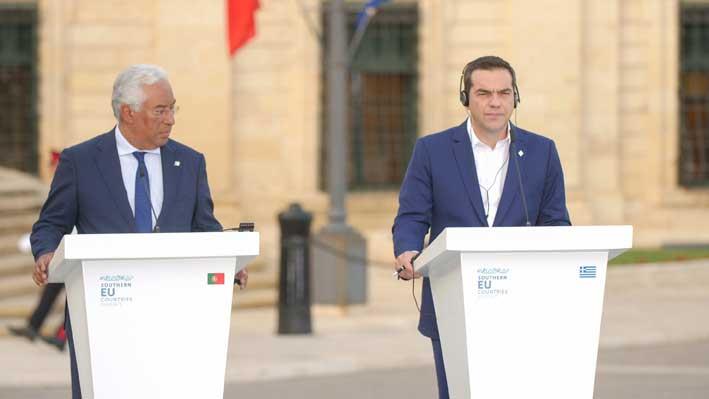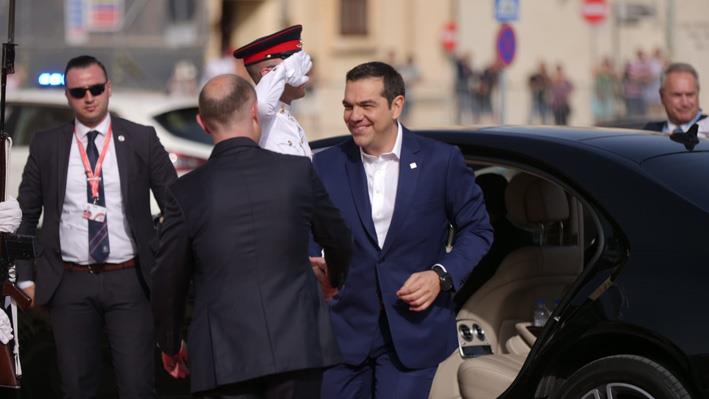Malta is open to discussing the idea of implementing a European minimum wage, Prime Minister Joseph Muscat said in a press conference following a round-table meeting between him and six other Mediterranean leaders as part of the Southern EU Countries Summit on Friday evening.
Addressing journalists and flanked by the heads of state of Italy, France, Spain, Portgual, Greece and Cyprus, Muscat said that Malta was focused on developing economic and social pillars, and was also open to discussing the idea of a European minimum wage.
Spain's Prime Minister Pedro Sanchez also spoke in favour of this proposal, saying that a more social Europe must be on the agenda; a Europe which will see fairer distribution of wealth. A European minimum wage is essential to reaching this goal, Sanchez said before noting that strong decisions must be taken in the make-up of the next European Budget. Portugal's Antonio Costa addressed this matter as well, saying that more investment had to be done to create a social europe that emphasises life long education and makes sure that nobody is left behind.
Muscat said that there was a common agreement on the main points addressed during the round-table meeting. He said that the first point of agreement was on the “climate emergency” and on issues relating to plastic pollution and the transition into electronic vehicles. This was a point reflected by all the other heads of state in their speeches.

Sanchez spoke of the fundamental need for ecological transition, Italy's Giuseppe Conte spoke of the need to tackle climate change in a synergic and industrial manner, and Greece's Alexis Tsipras said that awareness about the environment is growing within youths, and that this is a sign that tells government that this should be a priority for the coming five years and beyond.
Cyprus' Nicos Anastasiades spoke of the need for a very clear and forceful strategy which aims to deal with the climate emergency and which takes into consideration the special characteristics of each country so that everyone remains in line with the objectives set out within the landmark Paris Agreement, and Portugal's Antonio Costa said that a greener Europe signifies the need for more of a focus on the ciruclar economy, while France's Emmanuel Macron also noted that climate change remained a priority.
Muscat also noted that there was an agreement to continue to press on the issue of migration at a European level, and said that this cannot be decoupled from the debate on the Schengen area and freedom of movement, before also noting that Africa must be dealt with not just with a microscope on the migratory situation, but in a much broader, global context.
Macron meanwhile started his speech by saying that he shared the same vision as Muscat when it came to migration speaking of the need for disembarkment initiatives, more solidarity, and a solid mechanism to deal with the migratory crisis. He said that France is supportive of the countries at the frontline of the migration crisis and noted that they had acted in the most rapid of manners. He said that it is important for the European Union to deal with its borders and surveillance, and to also develop a good strategy for the African continent.

Tsipras said that migratory burdens should be shared by all, not just frontline countries, while Conte spoke of his concern over the situation in Libya, and of the need to strengthen co-operation shown towards Africa and work to create partnerships to increase investment and interaction with the continent. Sanchez, whose country is only 15 kilometres away from the African coast, said that Europeans need to consider Africa as an opportunity and should look to use better political intelligence to create better relationships that can be of benefit to both sides in the future.
Finally, Muscat affirmed his total and unwavering support to Cyprus on the recurring issues that the country was experiencing with Turkey, a sentiment which was echoed by each European leader, with Tsipras stating that the issue between the two countries was not merely a bi-lateral - or tri-lateral Greece is included - but is one which involves the whole of the EU against Turkey. Tensions have recently flared between Turkey and Cyprus centering on the issue of a Turkish ship which has moved to drill for oil in the Cypriot exclusive economic zone.
In the face of such support, Anastasiades thanked his Mediterranean counterparts for their unanimous show of support to the country against the actions “condemnable actions” of Turkey, which goes against the principles of the European Union, noting that despite what is happening within the Cypriot economic zone and despite those challenge, they would work towards a viable solution to the problem.


Speaking earlier in the day at the start of the roundtable meeting, Muscat chose to emphasise on the situation in Libya, gender equality, and climate change amongst other subjects as he opened a round-table meeting with six other Mediterranean heads of state.
Muscat said that decisions are being taken about the future of the European Union and that Mediterranean countries need to be sure that they are part of this decision-making process. “The EU needs to play a meaningful role by stimulating stability and growth in the region and beyond”, Muscat said before adding that there has to be a vocation to promote peace and stability in the world even if the world itself is seemingly becoming less stable.
He emphasised that there must be security in the Mediterranean, but also noted that countries needed to put forth a set of principles to shape the future of Europe and safeguard its citizen’s wellbeing and freedoms.

He said that the European social agenda must now be put at the forefront and that measures relating to gender equality, and LGBTIQ+ inclusion must be promoted across the board.
Turning his eyes to the economy, Muscat noted that as country’s economies improve across the board, a strategy for economic growth must be placed at the centre of new policies so that the Mediterranean is at the forefront of innovation for citizen-centric technologies that will enhance citizen’s socio-economic wellbeing.
He addressed the need to intensify work in dealing with climate change, but reserved his final point for addressing what he called a “crux” for both Malta and the region as a whole, that of security.
“Instability in Libya is a threat to us and to the European Union as a whole”, Muscat said.
He said that the call for the engagement of the United Nations to ensure full and comprehensive cessation of hostilities was but the first step of a very long process in Libya, one which links up with the need for more stability in the rest of Africa, with Muscat noting that it was crucial to start getting at the roots of the migratory crisis.

He noted that progress on migratory impasses was only made through the good will of some EU states, and said that more permanent mechanisms to deal with such situations are needed.
Muscat commended the work being done by the Libyan coastguard, noting that it had been trained with the help of EU countries and also received funding from the union to carry out its work.
Finally, he said that the meeting was an opportunity to put pen to paper and express full solidarity with Cyprus on their escalating situation with Turkey; “this is definitely something that you will find full support in from those around this table”, Muscat said while addressing Anastasiades (pictured below).

French President Emmanuel Macron was the first of the Mediterranean state leaders to arrive at Castille Palace on Friday afternoon for what was the sixth Southern EU Countries Summit, and the first to be hosted by Malta. Macron was greeted in Castille Square by Malta's Prime Minister Joseph Muscat and the pair walked into Castille for a private bi-lateral meeting.
Nicos Anastasiades, the President of Cyprus, was second to arrive. Macron and Muscat meanwhile, following their meeting, took in some of the scenes, with Muscat leading the French premier to the Upper Baracca gardens where they briefly admired the vista over the Grand Harbour.
Italian Prime Minister Giuseppe Conte was next to arrive at the Office of the Prime Minister and he was soon followed by Greek Prime Minister Alexis Tsipras, Spanish Prime Minister Pedro Sanchez and Portuguese Prime Minister Antonio Costa. The seven leaders gathered inside Castille for a round-table meeting, after which they addressed a press conference. The leaders then moved to the Grandmaster's Palace in St. George's Square for a dinner.

Known as the ‘EUMed7’, Malta, France, Portugal, Spain, Greece, Italy, and Cyprus formed the alliance in Brussels on 17 December 2013 to address issues of common interest in the Mediterranean region. The initial summit took place on 9 September 2016 in Athens, when talks focused on coordinating action on relevant issues from economic growth to regional security. Summits followed in Lisbon, Madrid and Rome, with the last held in Nicosia earlier this year, where discussions focused on major EU challenges, from climate change to migration and the Multi-annual Financial Framework. Prime Minister Muscat has attended all the summits.
Photos: Alenka Falzon